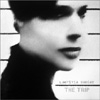 It has been twenty years since Laetitia Sadier and Tim Gane formed Stereolab. Sadier's voice remains a classic hypnotic sound and on her first solo record The Trip she meditates on change and loss in a personal response to her life's journey and in particular the death of her younger sister, Noelle.
It has been twenty years since Laetitia Sadier and Tim Gane formed Stereolab. Sadier's voice remains a classic hypnotic sound and on her first solo record The Trip she meditates on change and loss in a personal response to her life's journey and in particular the death of her younger sister, Noelle.
The Trip was made in two sessions with the help of Rebecca Gates, Richard Swift, and April March, as well as Julien Gasc and Emmanuel Mario, who collaborated on Sadier's project Monade. Stereolab and Monade relied heavily upon the complex qualities in Sadier's voice. She always manages to sound detached and intellectual yet with an extremely subtle sense of warmth and passion so effortless as to appear almost unconscious. This paradoxical combination draws us as easily as a magnet pulls iron filings.
Stereolab merged Brazilian and German influences with Reichian repetition and created their own instantly recognizable musical world. The voice of Sadier (and the equally important Mary Hansen) often shared the mix in an effective but democratic sound where they were only allowed to be as important as any other instrument. Maybe that is why audiences could hum along to their songs while seeming to miss the meaning of words. An obvious example is "Outer Accelerator," which cheerfully intoned "In whatever society, there invariably will seem to be just a few men keen to rule; overwhelming the majority will assent and allow them to do so." Equally, "Ping Pong" laid out a clear case against the brutality of the military industrial complex and its economic cycles: "It's alright 'cause the historical pattern has shown, how the economical cycle tends to revolve. In a round of decades three stages stand out in a loop. A slump and war then peel back to square one and back for more." All that before the song ends with accompanying "dum dum dee dums" and "duh duhs."
Sadier will never lose her hypnotic voice and she hasn't "gone" metal or country for this new release. But what she has done is move out to some extent from behind the rhythms and structures of Gane's music. In her words: "In Stereolab, the lyrics came second and were always to fit Tim’s music and not the other way around. I don’t have that creative tension with Tim anymore, and I’m finding that very liberating."
There are moments on The Trip when the music clicks and speeds into a marvelous groove that could well be Stereolab, but for the most part Sadier's voice and words are to the fore, dictating pace and rhythm and this suits the personal nature of the songs. Opening piece "One Million Year Trip" is about her sister's death and the title seems to me an update of the "short time to be here, long time gone" feeling, meaning: a million years is a way to articulate in human terms a measurement of forever without someone we love. Her cover of "Summertime" might sound unnecessary at first hearing but the two minute rendering must surely be a lament for the speed at which salad days, summer, and life, go by.
"By The Sea" is another goodbye song. It is spritely and happy/sad. Free associating, when I hear this I see Les Vacances de M. Hulot and so should you (see the film). As aformentioned, there are moments of propulsion during The Trip but overall it is somber, spare, and still. Sadier has written most of the songs but there are several covers including Les Rita Mitsouko’s "Un Soir Un Chien" which was used in Jean-Luc Godard’s 1987 film, Soigne Ta Droite. This is good since it has something of a Chic disco feel and because Catherine Ringer deserves more attention, too.
Stereolab seems to be in hibernation yet is set to release a collection of unheard material from the sessions for the 2008 album Chemical Chords. In October, lucky European audiences can hear Laetitia Sadier on tour. I could list until the cows come home the supposed roots which may lead to Sadier and Stereolab's ouvre. Everything from Gal Costa to Neu. But an intellectual response to her new album seems foolish and truth be told, I am somewhat incapable of critiquing Sadier. That paradoxical quality in her voice has always made her seem like a person first and a singer second. The brainwashed interviews (accessible on this site) only added to that feeling: portraying as they do her lovely, natural charm as much as her creative curiosity, down to earth way of talking and her intellectual rigor. The Trip is her attempt to make sense of life's tough inevitability and, while she does it with a customary light touch, the pain is tangible. It's a brave attempt. In the words of a Stereolab song: "We communicate more and more. In more defined ways than ever before. But no one has got anything to say. It's all very poor it's all just a bore. Someone has got to make the difference. Between the seeming and the meaning."
samples:
Read More


